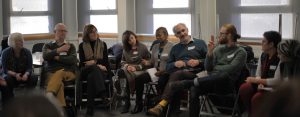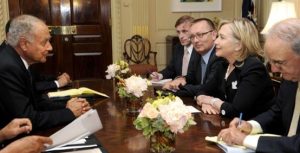“The rebel l eaders stated that they are willing to enter into dialogue with the government.” Author unknown but quoted in an hundred EFL textbooks
eaders stated that they are willing to enter into dialogue with the government.” Author unknown but quoted in an hundred EFL textbooks
A dialogue group at University of Winchester
The Three Faiths Forum is an admirable organisation which has done much to improve inter-religious relations in London. It has also committed a crime, at least to my ears, in coining the word “trialogue” to describe a conversational process between Jews, Christians and Muslims. Not only have they fashioned an ugly neologism but they have reinforced a widespread misperception that dialogue is an exchange between two sides. If the word “dialogue” had a Latin root this might be understandable, but we must go back to the Greek διᾰ́λογος to find its literal meaning: “through words”.
To be fair, anyone reading Plato’s Dialogues, imaginary conversations in which Socrates pits his wits against a series of intellectual opponents, might draw a similar conclusion that dialogue is a form of dialectical argument. But look more deeply and we see Socrates using words, listening and posing questions, exposing paradoxes and assumptions, to lead us to new understanding of dilemmas of the human condition, such as love and death. This is what we do in dialogue – use words to find meaning.
Fast forward a couple of millennia or so…. In the early 20th century a number of major figures in different disciplines began developing new ideas about dialogue. The mystical philosopher Martin Buber suggested that dialogue might be a means of breaking through defensive human relations by offering a fleeting but transformative glimpse (the “dialogic moment”) in which we experience another person not as separate object (“It”) but as a subject (“Thou”) with whom we briefly experience a deep empathic connection. [i]
In the USA theoretical physicist David Bohm was exploring the strange phenomena of the quantum world where objects do not behave in ways we can easily understand (think wave/particle duality). He suggested that there is a hidden “implicate order” in the universe of which we are only able to observe fragments as they emerge into view through a continual process of unfolding and enfolding from some deeper state. Bohm suggested that consciousness might function in the same way, with each one of us experiencing fragments which emerge from an underlying connecting whole. If we collaborate in thinking together in dialogue we may be able to put some of these pieces together and arrive an a new vision of who we are. Bohm also suggested that dialogue can act as a mirror in which we can watch our own thought processes as the dialogue conversation triggers reactions and new thoughts[1].This may lead to the startling revelation that our mental activity by no means as linear and logical as we would like to suppose, but disjunctured and chaotic.
Meanwhile in Russia the cultural theorist Mikhail Bakhtin was engaged in a close reading of Dostoevsky’s novels. He came to the conclusion that human nature is itself dialogic (“The dialogic self”). Our consciousness, he says, is polyphonic -composed of many different voices – the child, the father, the professional, the lover – which constantly jostle for our attention. Consciousness is an unpredictable conversation between the many characters which inhabit our inner world[2].
Looking from these angles suggests that dialogue might have some powerfully transformative possibilities;
- Finding new meaning through collaborative thinking
- Exploring the nature of thought and consciousness
- Revealing connections, between people and ideas
- Unpicking complex issues and contrdiction
The dialogue process, Bohm says, generates “impersonal friendship” between the participants, increasing trust and mutual confidence in each other. So perhaps we can add:
- Increasing trust and building relationships
That’s quite a list.
So the essence of dialogue, which I call “pure dialogue”, is to experiment with these possibilities in a conversation in which participants agree to share their thoughts and inner reactions with a minimum of structure or facilitation, and to follow wherever this collaborative thinking leads them. Pure dialogue is essentially exploratory and requires unrestricted freedom of thought and vigilance for new insights. To constrain it by imposing a goal risks snuffing out the essential spontaneity and openness which it demands. We soon find that dialogue is not well suited to concrete deliberative tasks, such as solving problems or making decisions. (Although dialogue may have a vital role in preparing people to do so by helping them understand their concerns more deeply). There’s nothing, of course, in this notion which requires participants to agree or change their minds.
And this is where the problems start.
I regularly work with groups in different contexts to see how far we can take these ideas in practice. What is immediately clear is that unlocking the potential of dialogue takes time, practice and skill[3]. You would be extremely fortunate to experience a breakthrough in consciousness the first time you sit down in a circle with others to do some thinking together. I frequently find that we cannot proceed without first deconstructing the connotations of the word “dialogue” which participants bring with them. We often start by distinguishing dialogue from other types of conversation process, notably negotiation, debate and discussion (which are each decision-making processes).
Negotiation – reaching agreement between parties with different interests
This is what the rebels and the government want. Some tough bargaining followed by an agreement (and perhaps even a peace prize)
Debate – winning an argument
The government wants to convince its citizens (or at least its supporters) of the case for negotiating with the rebels and to crush its opponents (to hearty applause and another election victory if things turn out well)
Discussion – evaluating arguments and information
The rebels and the government sit down, separately, before the negotiations to consider their options and agree their strategy (patting themselves on the back for their clever plan)
All this marches under the banner of “dialogue”, but isn’t.
To add to the confusion there is a plethora of NGOs and management consultants who have devised instrumental protocols for “dialogue” for the purposes of community building or dispute resolution. Some of these may appropriate some of the ideas of pure dialogue but they don’t embody or actualise it.
Many people, especially managers, struggle at first to appreciate the value of a process that appears to them to have no clear outcome. Unless participants buy into the idea that a journey into the unknown may be worth the ride, they are going to find free-range dialogue hard going[4]. We need to give people realistic expectations of what they are signing up to.
So maybe we need to find a new word to define and defend the concept of pure dialogue.
Montaigne[ii], that most affable of literary companions, talks in his famous essay on Friendship, says “it is good tot the “pleasure of rubbing your brain against that of another”. Much as I like the notion of “brain-rubbing” I doubt whether it would get the rebels and the government together (and I fear it might get me arrested in some places).
An invitation to “think together” conveys a clearer expectation of what’s going to happen in dialogue, particularly if it carries the rider “to understand this issue more deeply before we consider how to respond”. So maybe Co-thinking might be a contender?
Bohm remarks that “speaking is necessary, but the actual process of exploration takes place during listening — not only to others but to oneself.”[iii] So maybe we should put the emphasis on listening – mutual listening perhaps?
In September we will be opening a new space on the University of Winchester campus, a purpose-built circular chamber in which we can create ideal conditions for practising and experimenting with dialogue ideas. For the time being we’ll be calling it The Listening Place.
Simon Keyes
Simon.keyes@winchester.ac.uk
[1] Thought for Bohm includes “feelings, emotions, intentions and desires”.
[2] The concept of the Dialogic Self has been elaborated more systematically by Dutch psychiatrist Hubert Hermans who has produced a Standard list of over a hundred internal and external I-positions which may be present in our consciousness. Hermans (2010) Dialogical Self Theory. Cambridge
[3] There seem to be five key skills: listening, questions, suspending judgement, identifying assumptions and voicing
[4] Bohm points out that frustration and boredom may be essential experiences to goad a group into more generative thinking.
[i] Buber, Martin (2004) I & Thou. Continuum Impacts.
[ii]Montaigne, Michel de, (1595) The essayes: Book 1 Ch 26
[iii] David Bohm, Donald Factor and Peter Garrett (1991): Dialogue – A proposal http://www.david-bohm.net/dialogue/dialogue_proposal.html


